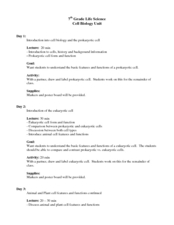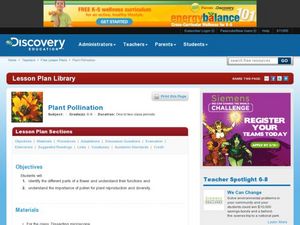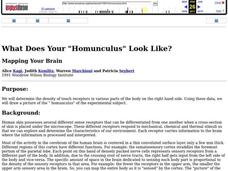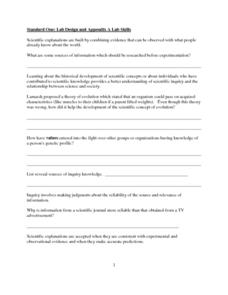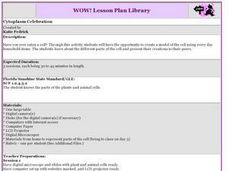Lincoln Public Schools
Cell Exploration Activities
Engage young biologists in exploring the mysteries of life with this collection of hands-on activities. Enlisting the help of numerous digital resources, students get an up-close look at the structure of plant and animal cells as they...
NOAA
Mud is Mud...or is it?
We know that the type of soil varies by location, but does the seafloor sediment also vary, or is it all the same? Scholars compare photos of the seafloor from two different locations: the Savannah Scarp and the Charleston Bump. Through...
Columbus City Schools
You Can’t Sneeze On This Tissue
Take your class' understanding of cells to the next level... or levels! Demonstrate the levels of organization using a variety of engaging methods. The teacher's guide includes the materials you'll need to execute a flower dissection,...
Columbus City Schools
To Measure its Mass or Volume?
Atoms, elements, and molecules, oh my! Teaching the fundamentals of chemistry to curious sixth graders has never been easier to accomplish. Here is a resource that pulls together everything needed to get them off to a good start,...
Curated OER
What Kind of Insect is That?
Fifth graders characterize insects and classify insects according to the Linnaean system. They use hand lenses or microscopes to examine insect body parts.
Curated OER
Salt: Up Close and Personal
Students predict, observe, and explain the details of salt as they view it under a variety of magnifications. They observe salt with the naked eye, and then under a hand lens, microscope, and the electron microscope.
Curated OER
Cells All Around
Students measure the size of an epithelial cell and to estimate the number of epithelial cells in a given area of the body. After watching a video on cells, student groups perform an experiment using a microscope to view some of their...
Curated OER
Inquiry in Science Using an Animal Behavior Model
Students observe a planaria without a microscope and with a stereoscopic microscope. They draw the planaria and describe its motion and eating habits. Students research planarias various body systems and behavior. They design an...
Curated OER
Comparing Plant and Animal Cells
In this comparing plant and animal cell worksheet, students use a microscope to observe cheek cells and onion cells. They compare their observations and answer 3 questions about their discoveries.
Curated OER
PARAMECIUM RESPONSES TO STIMIULI
Students design the test they use to examine, how the paramecium move, feed, and react to different types of stimuli such as a drop of vinegar. They conduct a lab experiment using a microscope.
Curated OER
Plasmolysis in Elodea Plant Cells
Students microscopically observe various subcellular components. They determine the effects of different salt solutions on Elodea plant cells. They detect the presence of chloroplasts, cell walls, and cell membranes of Elodea.
Curated OER
Animal Organs and the Study of Reproduction, Embryology and Cancer
Students examine organs from dogs and cats to study reproduction, embryology, and the identification of cancer. They record their observations at both the gross and microscopic levels. They present their information to the class.
Curated OER
Pond Life
Students explore pond ecosystems. In this living environment lesson, students observe the local pond and identify the living things they find by drawing pictures. Students observe organisms that were found in the pond by using a...
Curated OER
Cell (Biology)
Students conduct a series of activities to explore the nature of cells. In this biology lesson, students observe plant and animal cells under the microscope and compare them. They differentiate osmosis and diffusion.
Curated OER
Brine Shrimp Life Cycle
Third graders examine brine shrimp through "A Sea Monkey's Life" story. They study the living environments and life cycle of brine shrimp. They look at brine shrimp and cysts through a microscope, identifying new vocabulary that was...
Curated OER
Plants: Scattering Seeds
Middle schoolers collect and microscopically examine seeds from the school yard and neighborhood. In small groups, they draw and discuss the shapes of the seeds to determine each plant's method of dispersal. they also test two types of...
Curated OER
Plant Pollution
Middle schoolers study the different parts of a flower and their functions. In this pollination lesson students study a flower under a microscope.
Curated OER
What Does Your "Homunculus" Look Like?
Students investigate the density of touch receptors in various parts of the body. They discover how the body senses various stimuli, then maps a picture of the "homunculus" of the experimental subject.
Curated OER
Science Lessons for Grade 11
Students explore different activities in biology, physics and chemistry. In this science lesson, students examine chromosomes using a microscope and explain their significance in sustaining life on Earth. They investigate alkanes and...
Curated OER
How Do We Explore Strange Environments?
Young scholars identify and label the different parts of a robot, rover, or a spacecraft. They discuss and record all of the features their robot will need to accomplish its mission and be able to explain why they chose these features...
Curated OER
Eutrophication Experiments
Observe two different water samples and write down observations. Write a paragraph which predicts the relative amounts of nutrients, nitrates, and phosphates in the water samples. Compare water samples under a microscope.
Curated OER
Standard One: Lab Design and Appendix A Lab Skills
In this lab design and lab skills worksheet, students answer questions about experimental design including finding variables, determining controls, and graphing data. They answer questions about microscopy and label the parts of a...
Biology Junction
Nucleic Acids
In this DNA instructional activity, students identify the different parts of the DNA and color them. They complete 16 short answer and fill in the blank questions on DNA.
Curated OER
Cytoplasm Celebration
Students create a model of a cell using everyday household items. They view digital microscope images of cells and cell parts, watch an online video, create a cell model out of household images, and record their presentation using a...
Other popular searches
- Microscope Parts
- Compound Microscope Parts
- Label Microscope Parts
- Microscope Parts Functions
- Identify Microscope Parts
- Biology Lab Microscope Parts
- Microscope Parts Lab
- Microscope Parts and Use
- Microscopes Parts
- Parts of the Microscope Pdf















